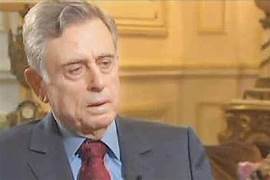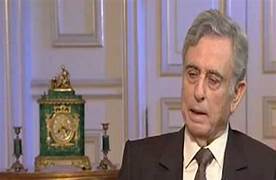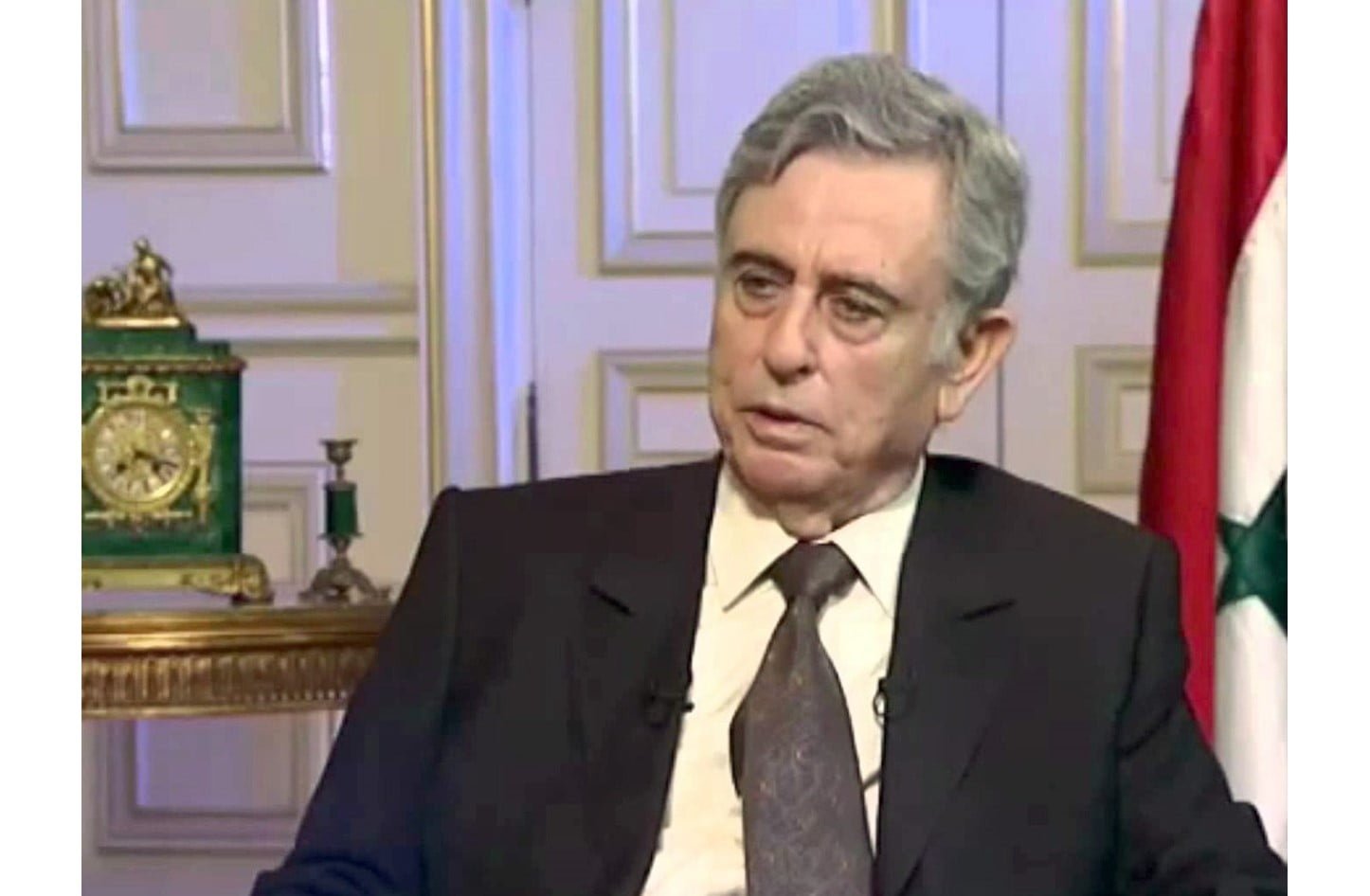Inside his house near the Arc de Triomphe, in the heart of the French capital, Paris, Al-Masaa met Abdel Halim Khaddam...the one most knowledgeable about the secrets of the Syrian file.
He was the one who accompanied Presidents Hafez and Bashar al-Assad as their deputy and foreign minister, in charge of two of the most dangerous and mysterious files in the Middle East: the Lebanese file and the Iraqi file.
Abdel Halim Khaddam, on the “Al-Masaa” chair, confessed the secrets of his relationship with the father-son regime, “mired in corruption and tyranny.” He talked about Hafez al-Assad's obsession with passing power to his family members, and how Bashar al-Assad sought to sit with him, as he began to criticize his father's regime, calling him "my uncle Abdul Halim." He also recalled the moment when he found himself president of the republic after the death of Hafez al-Assad, and the scenes of amending the constitution to make Bashar the president of the country, and how he decided to leave Syria and become the biggest enemy of the regime.
He said that Bashar plans to establish a statelet in the coast, where the Alawite majority belongs to the Assad family. Abdel Halim Khaddam also spoke about his relationship with Hassan II and Mehdi Ben Barka and how the Syrian position on the Sahara issue changed. He said that Algerian President Abdelaziz Bouteflika did not get rid of the thought of his predecessor, Houari Boumediene.
- What did you represent within the National Salvation Front, which was founded in 2006?
represent my situation. I am a political figure in Syria. I represent my situation and my people who support me and my friends. The important thing is that we organized the conference in June 2006 in London, and people of various affiliations attended it, including the Muslim Brotherhood and some secularists. The National Salvation Front was launched and we worked within a clear line. I never felt that there was a group working or discussing with a sectarian logic. Rather, we were practicing opposition with the prospect of overthrowing the regime
- How did the Syrian Muslim Brotherhood withdraw from the front?
When the crime of occupying Gaza by Israel occurred in 2009, I was surprised one day by someone telling me that the Brotherhood had issued a statement announcing the freezing of their membership in the Syrian opposition.
- Did you call to inquire about the reasons for withdrawal?
I called Mr. Ali Al-Bayanouni, the former Comptroller General of the Muslim Brotherhood, by phone, and asked him: Abu Anas, what have you done? He replied: By God, the circumstances of Gaza. I said to him: Aren’t we allies on the front? Why didn’t you tell us about this decision? At least we would have discussed it. He answered me, saying: By God, I called you around eight-thirty in the morning and they told me that you were sleeping.
I answered him by saying: You know that I stay up until three in the morning, and you too, and you know that someone who stays up at night cannot get up at seven in the morning. He replied to me, saying: By God, we took this stand for the sake of Gaza, so I answered him by saying: O Abu Anas, do you Bashar al-Assad mobilized his army to go to liberate Palestine, and you were mobilizing your army to liberate Damascus, then you gave up on that and stopped your opposition to him to support him in liberating Palestine? So he remained silent.
After that, we held a meeting of the Salvation Front. We discussed the issue of the withdrawal of the Muslim Brotherhood, but we did not take a decision to separate them. Rather, they were the ones who drafted a statement in April 2009 in which they announced their withdrawal from the Front. Then Abu Bashir (Farouk Tayfour) called me and said to me: Abu Jamal, please do not expel us from the front. A mistake occurred in our previous position and we will review it in the Shura Council.
Then they held a meeting and nothing came of it, and communications took place between us several times, especially between me and Farouk Tayfour, whom I found enthusiastic and gave me another breath for cooperation. Now, I am surprised by the statement of Mr. Muhammad Riad Shaqfa, the current Comptroller General of the Muslim Brotherhood. Either his memory is weak or his principles are weak.
- How do you view the position of the Hamas movement, which is part of the Muslim Brotherhood movement, regarding what is happening in Syria?
The Hamas movement is part of the Muslim Brotherhood, but its situation is sensitive. It cannot go to the greatest extent with the Muslim Brotherhood, nor can it go with the ruling regimes to the greatest extent. It has a good relationship with the regime in Syria, but it has not issued any direct position supporting it
-So, you appreciate her status and attitude?
Yes, its situation is difficult. There is the Israeli occupation and there are Palestinian-Palestinian conflicts. Even Mahmoud Abbas did not take any position against any Arab regime. Perhaps deep down he loves this regime and hates that, but he balances things out because there is a major issue at hand, for which he needs everyone’s support. Hamas, like Mahmoud Abbas, is excused for its state of affairs
Do you think Hezbollah, which is strong in Lebanon, will fall with the fall of the regime in Syria?
Certainly, if the regime falls in Syria, Hezbollah will fall, and widespread changes will take place in the region. The situation will change in Lebanon and Iraq, and Iran will return to its national borders.
- There are many leftist and Islamic organizations and intellectuals who still support the Syrian regime, on the basis that it is a regime of resistance?
Reluctance to what?
- Resistance to the Israeli occupation and American hegemony.
This is a big joke, the reluctant regime, the land of Syria has been occupied since 1967. Even in words, Bashar al-Assad does not talk about the Golan. As for the issue of supporting the resistance, we find Bashar al-Assad supporting Hezbollah, and he is doing so for the sake of Iran. Bashar al-Assad is merely a tool in the hands of Iran.
- Does it also host Hamas and the Palestinian leftist factions?
He cannot deport these organizations, because they do not pose a threat to him. The Palestinians in Syria have never interfered in Syrian affairs, and therefore their situation in Syria is comfortable for him and he benefits from it morally, as you say now that it is a regime of resistance.
- But he attracts the wrath of America and Israel, which classify him as a supporter of Iran?
As for him being an ally of Iran, the whole world knows that. Bashar al-Assad in Arab meetings, when he was discussing the issue of Iran, he would say: This is a topic I do not want anyone to discuss with me. If it were not for Iran, Bashar al-Assad would have ended after the assassination of Hariri
- Bashar al-Assad also has an honorable position towards Israel?
What is his position on Israel? Bashar Al-Assad does not talk about occupying Syrian territory because he does not want to anger Israel, he fears it. I return to the issue of his harboring Palestinian organizations, and I ask: What are these organizations doing to confront Israel in Syria? It is in Israel's interest that the Assad regime controls these organizations



